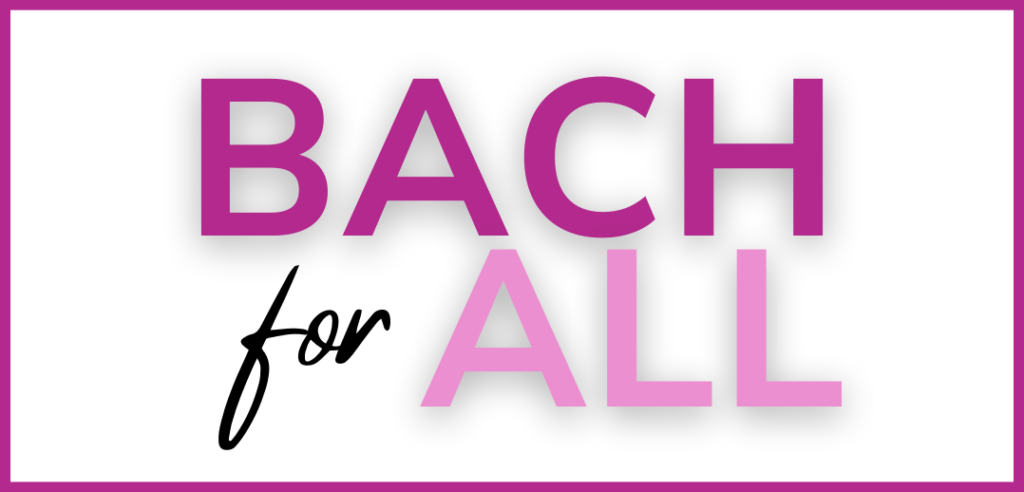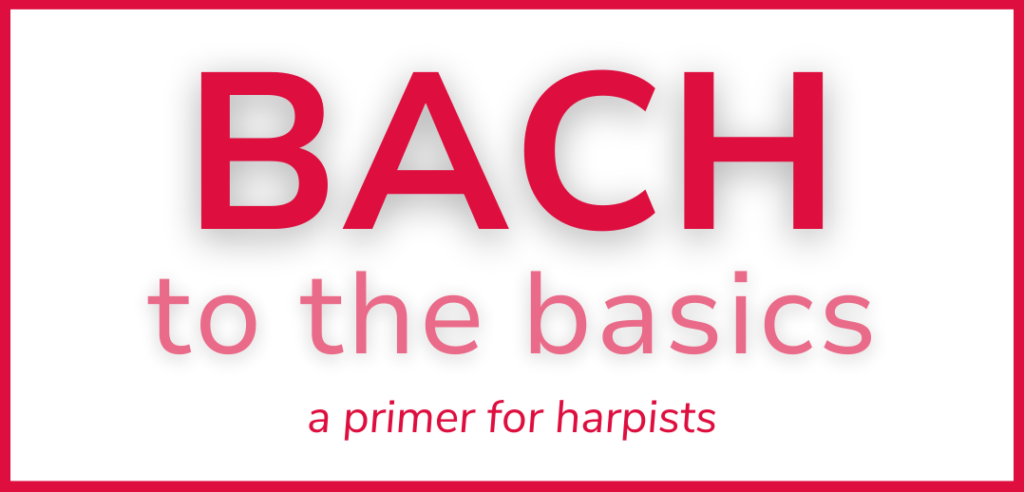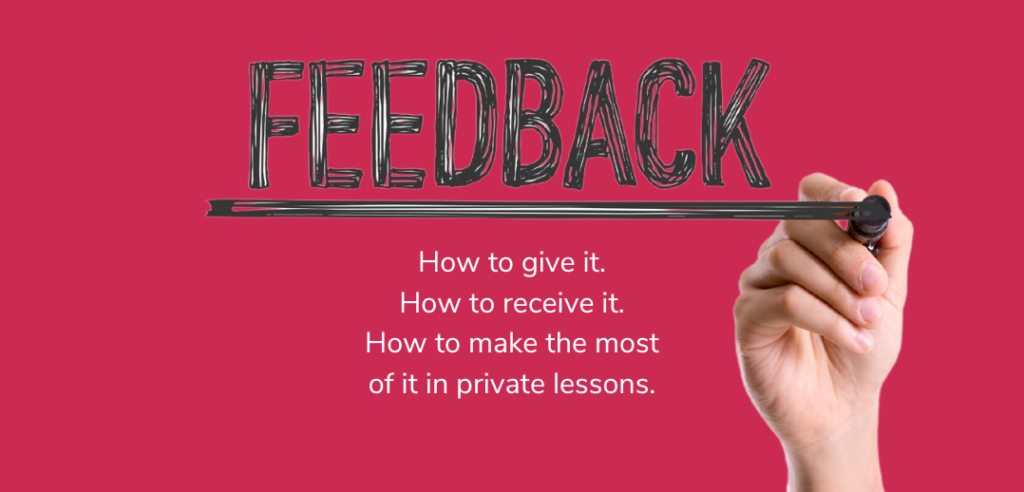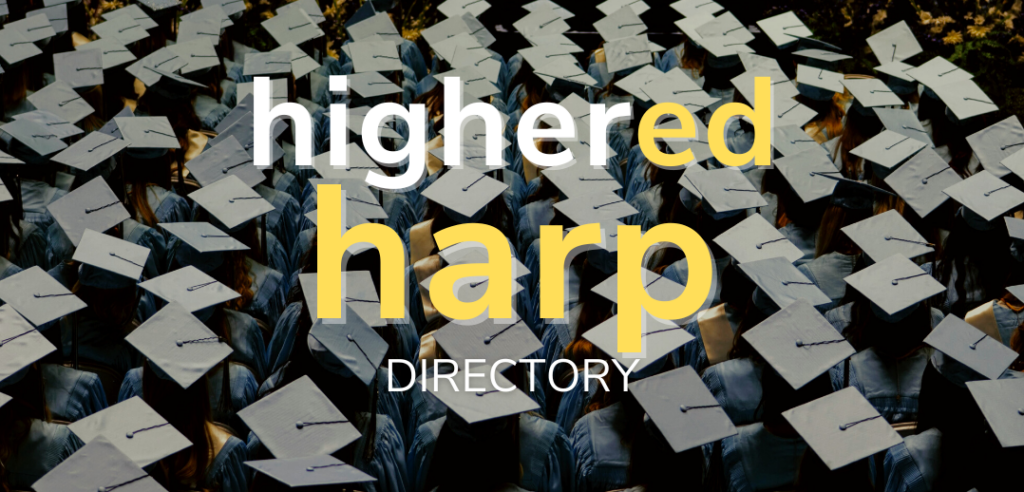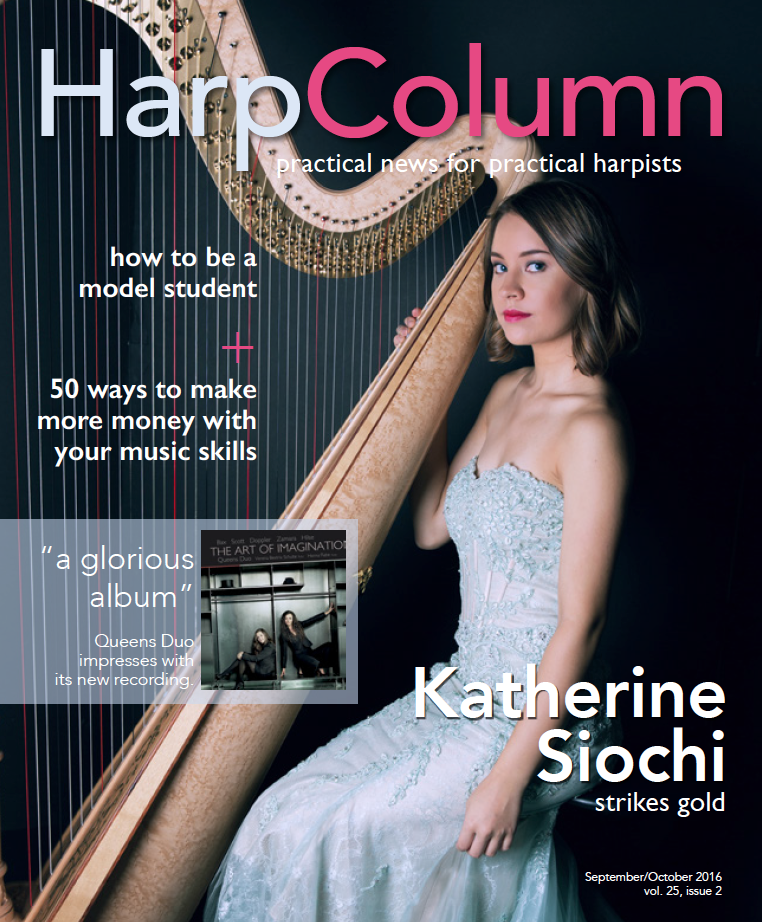Do you remember getting gold stars on your papers in school?
A gold star was not just a grade or the mark of a good paper; it was an affirmation, proof that you were a worthy student. I loved getting those gold stars.
But I didn’t often earn gold stars in my harp lessons. The unvarnished truth is that I was a terrible harp student.
When I was young, I had no idea how to practice, and consequently, I hated it. My parents tried bribes and timers and threats, but nothing they tried could make me practice. I skated by for a while on natural ability, but my lessons became increasingly frustrating to my teacher. She also tried all kinds of tactics to motivate me. Once she told me about one of her other students who had a perfect lesson the previous week. That did little to motivate me, but it certainly was daunting. How was that possible for anyone, let alone possible for me?
Eventually, I learned how to be a better harp student, in part through discoveries I made when I started teaching. I realized that I could help my students become not just better harpists, but also better students, by encouraging them in the habits that help them grow. Most of us are not born students. We develop habits that either propel us forward or keep us circling around success without ever reaching it.
Our teachers are, among other things, our instructors, our strategists, and our guides to the music world. They keep us focused, inspire us to work diligently, and teach us how to work productively. They invest in our success.
The expectations for the teacher end of the teacher-student relationship are widely understood and expected, but what exactly does a teacher want from and for a student? It’s not anything as quantifiable as a certain number of hours of practice or anything as objective as working through a particular curriculum or perfecting a technique. While those things are important,—even essential for achievement—they are not the key traits of an ideal student.
Learning to be a good student
Use Anne Sullivan’s acronym LEARN to remember the five key steps to becoming a model student:
Learn
Explore
Act
Respect
No one but you!
Most teachers will tell you that their ideal student is the one making steady (if not always speedy) progress, growing as a musician, and enjoying playing music. Why such vague measures? Because teachers have the perspective to understand what many students do not: learning music is less about reaching a specific destination as it is about the journey itself. Teachers also know from experience that the students who enjoy following the path, with all its hills and valleys, are the ones most likely to find the success they are looking for along the way.
To become a model student, you don’t need to be any particular age, or an over-achiever, or an apple-polisher, or a super talent. You simply need to cultivate the habits that will allow you to enjoy the journey, to invest yourself in the process, and to appreciate the rewards along the way.
I use the word LEARN as an acronym to help my students remember the habits I consider important for harp students of any age.
L is for Listen
Music is all about listening, and it is a critical skill to develop. Make it your habit to listen to live performances and recordings often. This is how you will discover repertoire and experience different performing styles and musical personalities. It is the best way to help you focus on the end result—what your piece will sound like when you have learned it.
Listening to music also develops your “music EQ,” your music experience quotient. Consider how much easier it is to begin learning a piece of music if you have heard it (or something similar to it) first. Every concert you hear, every YouTube video you watch, whether harp music or any other kind of music, adds to your inner library of knowledge. As you build this library, you are able to borrow items from it to apply to your own playing. The knowledge you gain, even if you’re unaware of it, enriches your musical vocabulary and increases your musical understanding. You become more musically intuitive.
Listen to your teacher. This seems obvious, but it is remarkably easy for students to leave a lesson without a clear memory of their teacher’s instructions. Go beyond paying attention; take notes in your lesson so that you remember what your teacher asked you to do, the tips and suggestions she gave, and the expectations she has for your next lesson. Be sure to ask any questions you may have. We teachers don’t always know what you don’t know.
Listen to your inner musician. This is the part of you that fell in love with music and went head over heels for the harp. Don’t sacrifice it as you strive to strengthen your technique or secure the notes. Always play and practice from the inside out, putting the music at the forefront of what you do. This prevents fatigue and burnout and keeps you in touch with that inner spark, the one that lights up whenever you hear your favorite piece.
Gold Star Student Tips:
- Purchase or make a lesson journal. Take it, along with a pencil, to your lesson to jot down your lesson notes. And keep it by your music stand so you can write down questions for your teacher as you think of them during the week.
- Make it a practice to attend one live concert each month. Take a friend and share your thoughts afterward over a cup of tea or a glass of wine.
- Write out an inspirational quote about music and keep it where you will see it each time you practice. One of my favorite quotes is from the Chinese philosopher Lao Tzu: “Music in the soul can be heard by the universe.”
E is for Explore
Music study is a wonderful adventure. It is important to remember that music is not just about getting to the right notes at the right time. It’s a voyage of discovery where you will learn about the harp, about music, and about yourself. To paraphrase Star Trek’s Captain Kirk, your mission is to explore new harp adventures, to seek out new music and new colleagues, to boldly try what you have never done before.
The harp community is a large and generous one. Be open to joining groups and gatherings. We harpists play well with others. Don’t limit your explorations to the harp world, though. Find friends who love to play and discuss all kinds of music as much as you do.
Along your harp journey, you may find that your most surprising discoveries are the ones you make about yourself. One of my favorite teaching moments is when I help a student realize how far she has come or that she has just achieved something she had thought she could never accomplish. So explore the possibilities. Go out on a limb. There’s no need to fear; your teacher is right beside you to steady you when you need it.
Gold Star Student Tips
- Make plans to attend a harp gathering or meeting. You should be able to find a local harp group but if you can’t, join one of the many vibrant online communities. Talking harp is fun, even if you have to type it!
- Ask your teacher for recommendations for masterclasses or workshops. Your teacher is your best resource for what would be especially helpful or interesting for you.
- Revisit a piece you learned and loved a long time ago. Do you remember how hard it seemed then? Give yourself a pat on the back for all the hard work you’ve done since then.
A is for Act
Your teacher gives you her best advice. You are inspired by outstanding performances. You are moved by a magnificent composition. But none of these things will help you unless you take action.
Practice is just the first step. I have seen students who practiced every day, but failed to make progress because their practice lacked focus. You should design your daily practice to follow through on the plans you made with your teacher at your lesson. Use the specific practice methods and tactics that will produce the progress you want.
My favorite saying about practice is this: Never use repetition as a substitute for attention. When you measure your practice solely in terms of time spent or the number of times you played a piece or passage, you are severely limiting your growth in that practice session and over the longer term. Repetition for its own sake leads to mindless, boring practice and unmusical playing. I agree that repetition is necessary to secure and consolidate notes and technique, but it should never be done without a musical focus or a specific objective.
We teachers occasionally need reminding that you need guidance not just about what to practice, but about how to practice it. But we love to be asked for our advice and tips. That’s a great way to earn a gold star.
Gold Star Student Tips
- Keep a practice journal for a week or two. Share it with your teacher and ask for her input. Could you have used your practice time and energy more effectively?
- Make a list of music that you would like to learn either some day or in the near future. Then, with your teacher’s help, choose one and decide when you will start working on it. Turn a dream into action!
- Take charge of your own progress by setting deadlines and goals. Setting finish dates for pieces is a powerful way to keep yourself accountable and on track. Your teacher can help you make these realistic and achievable.
R is for Respect
At the heart of every teacher-student relationship there must be mutual respect and trust. Music lessons work best when both student and teacher can feel free to offer ideas and opinions in an atmosphere of trust, consideration, and honesty.
Teachers respect students who are prepared (at least most of the time), interested, and willing to try new things. Students respect teachers who clearly place the student’s goals and interests at the heart of their work together.
One of the keys to building mutual respect is to strive for clarity. I believe that we teachers are often guilty of not being clear with our students about our expectations. It may be about our studio policies or recital requirements or something seemingly unimportant, but we forget to explain ourselves precisely and this can lead to a breakdown in trust.
And students should not be hesitant to be clear about their expectations either. Your goals should be the basis for your lessons; your teacher will help you plan the program to achieve those goals, possibly including some other areas of study that her experience shows her will be necessary for you.
A spirit of open communication is also essential, one that blends honesty with care and compassion. Correction of errors or techniques should not be stated as a personal affront, nor should they be taken that way. And if misunderstandings happen, both teacher and student must address them immediately, thoughtfully, and respectfully.
In addition to clarity and good communication, mutual respect requires commitment. As the student, you commit to following the plan that you and your teacher jointly devise. And your teacher commits to keeping your success, as you define it, in focus. When you both are committed to the same goal, you have multiplied by many times your chance for success, and the likelihood of many positive and productive lessons.
Gold Star Student Tips
- Err on the side of too much communication rather than too little. If you hate the piece your teacher assigned, say so. Say it as tactfully as possible, but say it. If you couldn’t practice that week or didn’t understand something or want to try something new, say that too. Your teacher wants to know.
- Ask questions. Why did you recommend this? How long should this take? Am I making progress? How can I do this better? Don’t wait for your teacher to read your mind. The sooner you ask your question, the sooner we can get on the right track.
- Respect your teacher’s time and privacy. Be on time. Don’t email excessively between lessons. (Teachers: be clear about what you consider acceptable!) Don’t expect your teacher to be your best friend; they have a different role to fill and they can’t do it all.
N is for No One But You!
Your harp lessons are for you and only you. They are part of your dream. They will only be effective if you do the work. They are only worth pursuing if they make you happy. The music you play will be the expression of your personal creativity and the result of your efforts.
Why is playing the harp important to you? What does the harp mean to you? What place do you want music to have in your life? Once you begin to consider the answers to these questions, striving to be a model student takes a slightly different meaning.
Being a model student is clearly not about playing the hardest piece or practicing the longest or being the most talented. It is about being the “best you,” discovering what the “best you” can be, and welcoming the wealth of experiences that will lead you there.
Gold Star Student Tips
- Continually connect with your love of music. Remember to play, not just practice. Remember to listen, to smile, to sing, and to dance.
- Appreciate the accomplishments of others. Support the other students in your teacher’s studio. We all bring a unique set of gifts to the world. Celebrate the richness.
- Send a note to someone who has helped you in your harp studies. It could be a relative, friend, teacher, or a harpist you’ve never met but who inspired you through their music. Not only will you lift their spirits, but it will help you remember the other people who have walked this road with you.
- No one but you can decide on your dreams and goals and, although your teacher is your guide on your harp journey, the journey is yours alone. No one can dream the dream for you. And you can’t play the harp for someone else’s dream.
Why Not?
Simon Sinek, author of the book Start with Why: How Great Leaders Inspire Everyone to Take Action, writes, “Our visions are the world we imagine, the tangible results of what the world would look like if we spent every day in pursuit of our WHY.”
Imagine your world as one where you are playing the harp the way you want, supported by a teacher who has partnered with you in pursuit of your “why.” It’s a beautiful picture—an inspiration to earn your gold star. •








